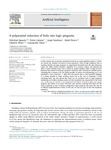A Polynomial Reduction of Forks Into Logic Programs

Use este enlace para citar
http://hdl.handle.net/2183/31038
A non ser que se indique outra cousa, a licenza do ítem descríbese como Atribución-NoComercial-SinDerivadas 4.0 Internacional
Coleccións
- Investigación (FIC) [1685]
Metadatos
Mostrar o rexistro completo do ítemTítulo
A Polynomial Reduction of Forks Into Logic ProgramsAutor(es)
Data
2022Cita bibliográfica
AGUADO, Felicidad, CABALAR, Pedro, FANDINNO, Jorge, PEARCE, David, PÉREZ, Gilberto and VIDAL, Concepción, 2022. A polynomial reduction of forks into logic programs. Artificial Intelligence. 2022. Vol. 308, p. 103712. DOI https://doi.org/10.1016/j.artint.2022.103712
Resumo
[Abstract] In this research note we present additional results for an earlier published paper [1]. There, we studied the problem of projective strong equivalence (PSE) of logic programs, that is, checking whether two logic programs (or propositional formulas) have the same behaviour (under the stable model semantics) regardless of a common context and ignoring the effect of local auxiliary atoms. PSE is related to another problem called strongly persistent forgetting that consists in keeping a program’s behaviour after removing its auxiliary atoms, something that is known to be not always possible in Answer Set Programming. In [1], we introduced a new connective ‘|’ called fork and proved that, in this extended language, it is always possible to forget auxiliary atoms, but at the price of obtaining a result containing forks. We also proved that forks can be translated back to logic programs introducing new hidden auxiliary atoms, but this translation was exponential in the worst case. In this note we provide a new polynomial translation of arbitrary forks into regular programs that allows us to prove that brave and cautious reasoning with forks has the same complexity as that of ordinary (disjunctive) logic programs and paves the way for an efficient implementation of forks. To this aim, we rely on a pair of new PSE invariance properties.
Palabras chave
Answer set programming
Non-monotonic reasoning
Equilibrium logic
Denotational semantics
Forgetting
Strong equivalence
Non-monotonic reasoning
Equilibrium logic
Denotational semantics
Forgetting
Strong equivalence
Descrición
Financiado para publicación en acceso aberto: Universidade da Coruña/CISUG
Versión do editor
Dereitos
Atribución-NoComercial-SinDerivadas 4.0 Internacional






